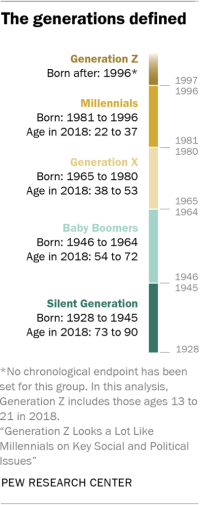For our look at Public Opinion
- Click here for it.
It’s too early to say with certainty how the views of this new generation will evolve. Most have yet to reach voting age, and their outlook could be altered considerably by changing national conditions, world events or technological innovations. Even so, two new Pew Research Center surveys, one of U.S. teens ages 13 to 17 and one of adults ages 18 and older, provide some compelling clues about where they may be headed and how their views could impact the nation’s political landscape.

Only about three-in-ten Gen Zers and Millennials (30% and 29%, respectively) approve of the way Donald Trump is handling his job as president. This compares with 38% of Gen Xers, 43% of Boomers and 54% of Silents. Similarly, while majorities in Gen Z and the Millennial generation say government should do more to solve problems, rather than that government is doing too many things better left to businesses and individuals, Gen Xers and Boomers are more evenly divided on this issue. For their part, most Silents would like to see a less activist government.
When it comes to views on race, the two younger generations are more likely than older generations to say that blacks are treated less fairly than whites in the United States today. And they are much more likely than their elders to approve of NFL players kneeling during the national anthem as a sign of protest.
The younger generations are also more accepting of some of the ways in which American society is changing. Majorities among Gen Z and the Millennial generation say increasing racial and ethnic diversity in the U.S. is a good thing for society, while older generations are less convinced of this. And they’re more likely to have a positive view of interracial and same-sex marriage than their older counterparts.
As a recent Pew Research Center report highlighted, Gen Z is the most racially and ethnically diverse generation we have seen, but this isn’t all that’s driving the attitudes of this generation when it comes to issues surrounding race and diversity. There are significant, if more modest, generational differences on these issues even among non-Hispanic whites.